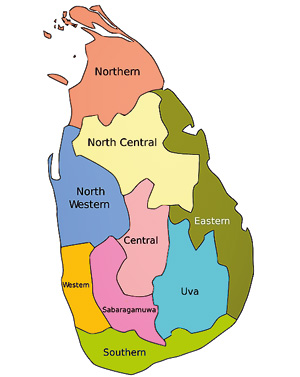Sunday Times 2
Constitutional reform: Lessons from the safeguards in the Spanish constitution
Spain, like Sri Lanka has at least one region which has from time to time and with some regularity wanted to cede from it. It is the region of Catalonia which lies in the North Eastern corner of Spain. It also borders France. Its principal city is Barcelona which hosted the Olympic games around 20 years ago.

If a safeguard which reduces the opportunity for fragmentation is introduced through the new constitution the majority community would be far more amenable to decentralise power to the provincial councils.
The constitution of Spain has decentralised power to the regions, like Catalonia, which is one of the most prosperous regions of that country. Whilst doing so, it has a clause in its constitution which safeguards the country from fragmentation. In effect, it states that any region can cede from Spain only if the majority of Spain voting at a referendum vote for such a cessation. Therefore, when there was an unofficial poll conducted in Catalonia in November 2014 where around 80% of those polled favoured independence from Spain, the Spanish constitutional court ruled such act to be ‘illegal’ as it was ultra vires to the constitution.
More recently (on 27 September 2015) there was a vote taken in the regional assembly of Catalonia, as to whether Catalonia should cede from Spain. The so called ‘pro independence coalition’, which consisted of a hoch poch of political parties united solely for the purpose of voting for independence from Spain, won the day. They won the support of 72 of the 135 delegates of the Catalan legislature. They voted in favour of holding a referendum limited to the Catalan region where the Catalans alone will be asked whether they wish to separate from Spain and create their own state or remain a part Spain.
If this matter were to be pursued further by the regional legislature of Catalonia it is more than likely that the legality of such action will be successfully challenged in the Spanish supreme court. This is made possible because of the safeguards that are inbuilt into the Spanish constitution. The architects of the constitution identified the unique problems faced by their country, Spain. They were visionaries and made provision to safeguard the territorial integrity of their country.
Sri Lanka finds itself in a unique position in its history at this point in time. For the first time in our post independent history we have the two main political parties, the United National Party (UNP) and the Sri Lanka Freedom Party (SLFP, at least a great part of it), forming a national government rather than perhaps irresponsibly opposing any concessions that the party in power tries to make to resolve the national question. At the same time, we have what may be best described as a group of moderate leaders at the helm of the Tamil National Alliance which is the official opposition. It is also to be noted that they trounced the hard-line pro LTTE group convincingly during the last general election held in August 2015. This is evidence that the great majority of citizens living in the North and East want a settlement of the national question without fragmenting the nation just as much as everyone else.
Those to whom the task is bestowed to draft the new constitution should bear in mind the unique ethnic mix we have in our small island, rather like the drafters of the Spanish constitution in the years gone by. It is the view of this writer that if a safeguard which reduces substantially the opportunity for fragmentation is introduced via the new constitution (such as what is found in Spanish constitution), the majority community would be far more amenable to decentralise power to the provincial councils which are the equivalent of regional assemblies found in larger countries like Spain. This could therefore lead to a ‘win win’ position where all communities stand to gain. It is up to us to grasp this golden opportunity to resolve the national question and not let it go by default.
(The writer is an attorney at law and solicitor and was a lecturer in constitutional law.)

